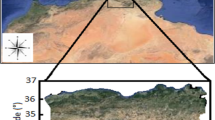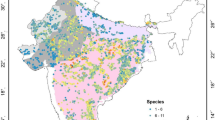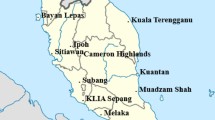Abstract
For effective planning of irrigation scheduling, water budgeting, crop simulation, and water resources management, the accurate estimation of reference evapotranspiration (ETo) is essential. In the current study, the hybrid support vector regression (SVR) coupled with Whale Optimization Algorithm (SVR-WOA) was employed to estimate the monthly ETo at Algiers and Tlemcen meteorological stations positioned in the north of Algeria under three different optimal input scenarios. Monthly climatic parameters, i.e., solar radiation (Rs), wind speed (Us), relative humidity (RH), and maximum and minimum air temperatures (Tmax and Tmin) of 14 years (2000–2013), were obtained from both stations. The accuracy of the hybrid SVR-WOA model was appraised against hybrid SVR-MVO (Multi-Verse Optimizer), and SVR-ALO (Ant Lion Optimizer) models through performance measures, i.e., mean absolute error (MAE), root-mean-square error (RMSE), index of scattering (IOS), index of agreement (IOA), Pearson correlation coefficient (PCC), Nash-Sutcliffe efficiency (NSE), and graphical interpretation (time-variation and scatter plots, radar chart, and Taylor diagram). The results showed that the SVR-WOA model performed superior to the SVR-MVO and SVR-ALO models at both stations in all scenarios. The SVR-WOA-1 model with five inputs (i.e., Tmin, Tmax, RH, Us, Rs: scenario-1) had the lowest value of MAE = 0.0658/0.0489 mm/month, RMSE = 0.0808/0.0617 mm/month, IOS = 0.0259/0.0165, and the highest value of NSE = 0.9949/0.9989, PCC = 0.9975/0.9995, and IOA = 0.9987/0.9997 for testing period at both stations, respectively. The proposed hybrid SVR-WOA model was found to be more appropriate and efficient in comparison to SVR-MVO and SVR-ALO models for estimating monthly ETo in the study region.








Similar content being viewed by others
References
Abdel-Basset, M., El-Shahat, D., Faris, H., & Mirjalili, S. (2019). A binary multi-verse optimizer for 0-1 multidimensional knapsack problems with application in interactive multimedia systems. Computers and Industrial Engineering, 132, 187–206. https://doi.org/10.1016/j.cie.2019.04.025.
Adnan, R. M., Malik, A., Kumar, A., Parmar, K. S., & Kisi, O. (2019). Pan evaporation modeling by three different neuro-fuzzy intelligent systems using climatic inputs. Arabian Journal of Geosciences, 12(19), 606. https://doi.org/10.1007/s12517-019-4781-6.
Aljarah, I., Mafarja, M., Heidari, A. A., Faris, H., & Mirjalili, S. (2020). Multi-verse optimizer: theory, literature review, and application in data clustering. Studies in Computational Intelligence. https://doi.org/10.1007/978-3-030-12127-3_8.
Allen, R. G., Pereira, L. S., Raes, D., & Smith, M. (1998). Crop evapotranspiration: Guidelines for computing crop requirements. FAO Irrig. Drain. Pap. 56, 300.
Ashrafzadeh, A., Kişi, O., Aghelpour, P., Biazar, S. M., & Masouleh, M. A. (2020). Comparative study of time series models, support vector machines, and GMDH in forecasting long-term evapotranspiration rates in northern Iran. Journal of Irrigation and Drainage Engineering, 146, 04020010. https://doi.org/10.1061/(asce)ir.1943-4774.0001471.
Banadkooki, F. B., Ehteram, M., Ahmed, A. N., Teo, F. Y., Ebrahimi, M., Fai, C. M., Huang, Y. F., & el-Shafie, A. (2020). Suspended sediment load prediction using artificial neural network and ant lion optimization algorithm. Environmental Science and Pollution Research, 27, 38094–38116. https://doi.org/10.1007/s11356-020-09876-w.
Banda, P., Cemek, B., & Küçüktopcu, E. (2018). Estimation of daily reference evapotranspiration by neuro computing techniques using limited data in a semi-arid environment. Archives of Agronomy and Soil Science, 64, 916–929. https://doi.org/10.1080/03650340.2017.1414196.
Bastiaanssen, W. G. M., Menenti, M., Feddes, R. A., & Holtslag, A. A. M. (1998a). A remote sensing surface energy balance algorithm for land (SEBAL): 1. Formulation. Journal of Hydrology, 212-213, 198–212. https://doi.org/10.1016/S0022-1694(98)00253-4.
Bastiaanssen, W. G. M., Pelgrum, H., Wang, J., Ma, Y., Moreno, J. F., Roerink, G. J., & Van Der Wal, T. (1998b). A remote sensing surface energy balance algorithm for land (SEBAL): 2. Validation. Journal of Hydrology, 212-213, 213–229. https://doi.org/10.1016/S0022-1694(98)00254-6.
Fadaee, M., Mahdavi-Meymand, A., & Zounemat-Kermani, M. (2020). Suspended sediment prediction using integrative soft computing Models: On the Analogy between the Butterfly Optimization and Genetic Algorithms. Geocarto International. https://doi.org/10.1080/10106049.2020.1753821.
Ferreira, L. B., & da Cunha, F. F. (2020). New approach to estimate daily reference evapotranspiration based on hourly temperature and relative humidity using machine learning and deep learning. Agricultural Water Management, 234, 106113. https://doi.org/10.1016/j.agwat.2020.106113.
Ferreira, L. B., da Cunha, F. F., de Oliveira, R. A., & Fernandes Filho, E. I. (2019). Estimation of reference evapotranspiration in Brazil with limited meteorological data using ANN and SVM—a new approach. Journal of Hydrology, 572, 556–570. https://doi.org/10.1016/j.jhydrol.2019.03.028.
Gavili, S., Sanikhani, H., Kisi, O., & Mahmoudi, M. H. (2018). Evaluation of several soft computing methods in monthly evapotranspiration modelling. Meteorological Applications, 25, 128–138. https://doi.org/10.1002/met.1676.
Granata, F. (2019). Evapotranspiration evaluation models based on machine learning algorithms—a comparative study. Agricultural Water Management, 217, 303–315. https://doi.org/10.1016/j.agwat.2019.03.015.
Guan, Y., Mohammadi, B., Pham, Q. B., Adarsh, S., Balkhair, K. S., Rahman, K. U., Linh, N. T. T., & Tri, D. Q. (2020). A novel approach for predicting daily pan evaporation in the coastal regions of Iran using support vector regression coupled with krill herd algorithm model. Theoretical and Applied Climatology. https://doi.org/10.1007/s00704-020-03283-4.
Hamouda, E., Sara, E. M., & Tarek, M. (2018). Ant lion optimization algorithm for kidney exchanges. PLoS One, 13, e0196707. https://doi.org/10.1371/journal.pone.0196707.
Heddam, S., Watts, M. J., Houichi, L., Djemili, L., & Sebbar, A. (2018). Evolving connectionist systems (ECoSs): a new approach for modeling daily reference evapotranspiration (ET0). Environmental Monitoring and Assessment, 190(9), 516. https://doi.org/10.1007/s10661-018-6903-0.
Heidari, A. A., Faris, H., Mirjalili, S., Aljarah, I., & Mafarja, M. (2020). Ant lion optimizer: Theory, literature review, and application in multi-layer perceptron neural networks. Studies in Computational Intelligence. https://doi.org/10.1007/978-3-030-12127-3_3.
Kalteh, A. M. (2013). Monthly river flow forecasting using artificial neural network and support vector regression models coupled with wavelet transform. Computers & Geosciences, 54, 1–8. https://doi.org/10.1016/j.cageo.2012.11.015.
Karbasi, M. (2018). Forecasting of multi-step ahead reference evapotranspiration using Wavelet-Gaussian process regression model. Water Resources Management, 32, 1035–1052. https://doi.org/10.1007/s11269-017-1853-9.
Khan, M. S., & Coulibaly, P. (2006). Application of support vector machine in lake water level prediction. Journal of Hydrologic Engineering, 11(3), 199–205. https://doi.org/10.1061/(ASCE)1084-0699(2006)11:3(199).
Khosravi, K., Daggupati, P., Alami, M. T., Awadh, S. M., Ghareb, M. I., Panahi, M., Pham, B. T., Rezaie, F., Qi, C., & Yaseen, Z. M. (2019). Meteorological data mining and hybrid data-intelligence models for reference evaporation simulation: a case study in Iraq. Computers and Electronics in Agriculture, 167, 105041. https://doi.org/10.1016/j.compag.2019.105041.
Kisi, O. (2016). Modeling reference evapotranspiration using three different heuristic regression approaches. Agricultural Water Management, 169, 162–172. https://doi.org/10.1016/j.agwat.2016.02.026.
Kisi, O., & Alizamir, M. (2018). Modelling reference evapotranspiration using a new wavelet conjunction heuristic method: Wavelet extreme learning machine vs wavelet neural networks. Agricultural and Forest Meteorology, 263, 41–48. https://doi.org/10.1016/j.agrformet.2018.08.007.
Kisi, O., & Demir, V. (2016). Evapotranspiration estimation using six different multi-layer perceptron algorithms. Irrigation & Drainage Systems Engineering., 5. https://doi.org/10.4172/2168-9768.1000164.
Kisi, O., Sanikhani, H., Zounemat-Kermani, M., & Niazi, F. (2015). Long-term monthly evapotranspiration modeling by several data-driven methods without climatic data. Computers and Electronics in Agriculture, 115, 66–77. https://doi.org/10.1016/j.compag.2015.04.015.
Kose, U. (2018). An ant-lion optimizer-trained artificial neural network system for chaotic electroencephalogram (EEG) prediction. Applied Sciences, 8(9), 1613. https://doi.org/10.3390/app8091613.
Kumar, D., Adamowski, J., Suresh, R., & Ozga-Zielinski, B. (2016). Estimating evapotranspiration using an extreme learning machine model: case study in North Bihar, India. Journal of Irrigation and Drainage Engineering, 142(9), 4016032. https://doi.org/10.1061/(asce)ir.1943-4774.0001044.
Lin, J.-Y., Cheng, C.-T., & Chau, K.-W. (2006). Using support vector machines for long-term discharge prediction. Hydrological Sciences Journal, 51(4), 599–612. https://doi.org/10.1623/hysj.51.4.599.
Louis, Y. H. T., Kuok, K. K., Imteaz, M., Lai, W. Y., & Derrick, K. X. L. (2019). Development of whale optimization neural network for daily water level forecasting. International Journal of Advanced Trends in Computer Science and Engineering. https://doi.org/10.30534/ijatcse/2019/04832019.
Majumder, P., & Eldho, T. I. (2020). Artificial neural network and grey wolf optimizer based surrogate simulation-optimization model for groundwater remediation. Water Resources Management, 34(2), 763–783. https://doi.org/10.1007/s11269-019-02472-9.
Malik, A., & Kumar, A. (2020). Meteorological drought prediction using heuristic approaches based on effective drought index: a case study in Uttarakhand. Arabian Journal of Geosciences, 13(6), 276. https://doi.org/10.1007/s12517-020-5239-6.
Malik, A., Kumar, A., Ghorbani, M. A., Kashani, M. H., Kisi, O., & Kim, S. (2019a). The viability of co-active fuzzy inference system model for monthly reference evapotranspiration estimation: case study of Uttarakhand State. Hydrology Research, 50(6), 1623–1644. https://doi.org/10.2166/nh.2019.059.
Malik, A., Kumar, A., Kisi, O., & Shiri, J. (2019b). Evaluating the performance of four different heuristic approaches with Gamma test for daily suspended sediment concentration modeling. Environmental Science and Pollution Research, 26(22), 22670–22687. https://doi.org/10.1007/s11356-019-05553-9.
Malik, A., Tikhamarine, Y., Souag-Gamane, D., Kisi, O., & Pham, Q. B. (2020). Support vector regression optimized by meta-heuristic algorithms for daily streamflow prediction. Stochastic Environmental Research and Risk Assessment. https://doi.org/10.1007/s00477-020-01874-1.
Mattar, M. A. (2018). Using gene expression programming in monthly reference evapotranspiration modeling: a case study in Egypt. Agricultural Water Management, 198, 28–38. https://doi.org/10.1016/j.agwat.2017.12.017.
Mehdizadeh, S., Behmanesh, J., & Khalili, K. (2017). Using MARS, SVM, GEP and empirical equations for estimation of monthly mean reference evapotranspiration. Computers and Electronics in Agriculture, 139, 103–114. https://doi.org/10.1016/j.compag.2017.05.002.
Mirjalili, S. (2015). The ant lion optimizer. Advances in Engineering Software, 83, 80–98. https://doi.org/10.1016/j.advengsoft.2015.01.010.
Mirjalili, S., & Lewis, A. (2016). The whale optimization algorithm. Advances in Engineering Software, 95, 51–67. https://doi.org/10.1016/j.advengsoft.2016.01.008.
Mirjalili, S., Mirjalili, S. M., & Hatamlou, A. (2016). Multi-verse optimizer: A nature-inspired algorithm for global optimization. Neural Computing and Applications, 27, 495–513. https://doi.org/10.1007/s00521-015-1870-7.
Mohammadi, B., & Mehdizadeh, S. (2020). Modeling daily reference evapotranspiration via a novel approach based on support vector regression coupled with whale optimization algorithm. Agricultural Water Management, 237, 106145. https://doi.org/10.1016/j.agwat.2020.106145.
Mohammadrezapour, O., Piri, J., & Kisi, O. (2019). Comparison of SVM, ANFIS and GEP in modeling monthly potential evapotranspiration in an arid region (case study: Sistan and Baluchestan Province, Iran). Water Supply, 19(2), 392–403. https://doi.org/10.2166/ws.2018.084.
Nash, J. E., & Sutcliffe, J. V. (1970). River flow forecasting through conceptual models part I—a discussion of principles. Journal of Hydrology, 10(3), 282–290. https://doi.org/10.1016/0022-1694(70)90255-6.
Pham, Q. B., Abba, S. I., Usman, A. G., Linh, N. T. T., Gupta, V., Malik, A., Costache, R., Vo, N. D., & Tri, D. Q. (2019). Potential of hybrid data-intelligence algorithms for multi-station modelling of rainfall. Water Resources Management, 33(15), 5067–5087. https://doi.org/10.1007/s11269-019-02408-3.
Raza, A., Shoaib, M., Faiz, M. A., Baig, F., Khan, M. M., Ullah, M. K., & Zubair, M. (2020). Comparative assessment of reference evapotranspiration estimation using conventional method and machine learning algorithms in four climatic regions. Pure and Applied Geophysics, 177, 4479–4508. https://doi.org/10.1007/s00024-020-02473-5.
Saggi, M. K., & Jain, S. (2019). Reference evapotranspiration estimation and modeling of the Punjab Northern India using deep learning. Computers and Electronics in Agriculture, 156, 387–398. https://doi.org/10.1016/j.compag.2018.11.031.
Sanikhani, H., Deo, R. C., Samui, P., Kisi, O., Mert, C., Mirabbasi, R., Gavili, S., & Yaseen, Z. M. (2018). Survey of different data-intelligent modeling strategies for forecasting air temperature using geographic information as model predictors. Computers and Electronics in Agriculture, 152, 242–260. https://doi.org/10.1016/j.compag.2018.07.008.
Seifi, A., & Riahi, H. (2020). Estimating daily reference evapotranspiration using hybrid gamma test-least square support vector machine, gamma test-ANN, and gamma test-ANFIS models in an arid area of Iran. Journal of Water and Climate Change., 11, 217–240. https://doi.org/10.2166/wcc.2018.003.
Sentelhas, P. C., Gillespie, T. J., & Santos, E. A. (2010). Evaluation of FAO Penman-Monteith and alternative methods for estimating reference evapotranspiration with missing data in Southern Ontario, Canada. Agricultural Water Management, 97, 635–644. https://doi.org/10.1016/j.agwat.2009.12.001.
Shiri, J. (2018). Improving the performance of the mass transfer-based reference evapotranspiration estimation approaches through a coupled wavelet-random forest methodology. Journal of Hydrology, 561(March), 737–750. https://doi.org/10.1016/j.jhydrol.2018.04.042.
Shuttleworth, W. J., & Wallace, J. S. (1985). Evaporation from sparse crops-an energy combination theory. The Quarterly Journal of the Royal Meteorological Society., 111, 839–855. https://doi.org/10.1002/qj.49711146510.
Singh, A., Malik, A., Kumar, A., & Kisi, O. (2018). Rainfall-runoff modeling in hilly watershed using heuristic approaches with gamma test. Arabian Journal of Geosciences, 11(11), 261. https://doi.org/10.1007/s12517-018-3614-3.
Smola, A. (1996). Regression estimation with support vector learning machines. Master’s thesis, Technische Universit at M unchen.
Su, Z. (2002). The surface energy balance system (SEBS) for estimation of turbulent heat fluxes. Hydrology and Earth System Sciences, 6, 85–100. https://doi.org/10.5194/hess-6-85-2002.
Tao, H., Diop, L., Bodian, A., Djaman, K., Ndiaye, P. M., & Yaseen, Z. M. (2018). Reference evapotranspiration prediction using hybridized fuzzy model with firefly algorithm: regional case study in Burkina Faso. Agricultural Water Management, 208, 140–151. https://doi.org/10.1016/j.agwat.2018.06.018.
Taylor, K. E. (2001). Summarizing multiple aspects of model performance in a single diagram. Journal of Geophysical Research-Atmospheres, 106(D7), 7183–7192. https://doi.org/10.1029/2000JD900719.
Testa, G., Gresta, F., & Cosentino, S. L. (2011). Dry matter and qualitative characteristics of alfalfa as affected by harvest times and soil water content. European Journal of Agronomy, 34(3), 144–152. https://doi.org/10.1016/j.eja.2010.12.001.
Tharwat, A., & Hassanien, A. E. (2018). Chaotic antlion algorithm for parameter optimization of support vector machine. Applied Intelligence, 48(3), 670–686. https://doi.org/10.1007/s10489-017-0994-0.
Tikhamarine, Y., Malik, A., Kumar, A., Souag-Gamane, D., & Kisi, O. (2019a). Estimation of monthly reference evapotranspiration using novel hybrid machine learning approaches. Hydrological Sciences Journal, 64(15), 1824–1842. https://doi.org/10.1080/02626667.2019.1678750.
Tikhamarine, Y., Souag-Gamane, D., & Kisi, O. (2019b). A new intelligent method for monthly streamflow prediction: hybrid wavelet support vector regression based on grey wolf optimizer (WSVR–GWO). Arabian Journal of Geosciences, 12(17), 540. https://doi.org/10.1007/s12517-019-4697-1.
Tikhamarine, Y., Malik, A., Souag-Gamane, D., & Kisi, O. (2020a). Artificial intelligence models versus empirical equations for modeling monthly reference evapotranspiration. Environmental Science and Pollution Research, 27(24), 30001–30019. https://doi.org/10.1007/s11356-020-08792-3.
Tikhamarine, Y., Souag-Gamane, D., Ahmed, A. N., Sammen, S. S., Kisi, O., Huang, Y. F., & El-Shafie, A. (2020b). Rainfall-runoff modelling using improved machine learning methods: Harris hawks optimizer vs. particle swarm optimization. Journal of Hydrology, 589, 125133. https://doi.org/10.1016/j.jhydrol.2020.125133.
Tikhamarine, Y., Souag-Gamane, D., Najah Ahmed, A., Kisi, O., & El-Shafie, A. (2020c). Improving artificial intelligence models accuracy for monthly streamflow forecasting using grey Wolf optimization (GWO) algorithm. Journal of Hydrology, 582, 124435. https://doi.org/10.1016/j.jhydrol.2019.124435.
Valiantzas, J. D. (2013a). Simplified reference evapotranspiration formula using an empirical impact factor for penman’s aerodynamic term. Journal of Hydrologic Engineering, 18, 108–114. https://doi.org/10.1061/(ASCE)HE.1943-5584.0000590.
Valiantzas, J. D. (2013b). Simple ET0 forms of Penman’s equation without wind and/or humidity data. I: theoretical development. Journal of Irrigation and Drainage Engineering, 139(1), 1–8. https://doi.org/10.1061/(ASCE)IR.1943-4774.0000520.
Valle Júnior, L. C. G., Ventura, T. M., Souza, R. S. R., de Nogueira, J. S., de Lobo, F. A., Vourlitis, G. L., & Rodrigues, T. R. (2020). Comparative assessment of modelled and empirical reference evapotranspiration methods for a Brazilian savanna. Agricultural Water Management, 232, 106040. https://doi.org/10.1016/j.agwat.2020.106040.
Vapnik, V. N. (1995). The nature of statistical learning theory (p. 314). New York: Springer.
Willmott, C. J. (1981). On the validation of models. Physical Geography, 2(2), 184–194. https://doi.org/10.1080/02723646.1981.10642213.
Yan, X., & Mohammadian, A. (2020). Forecasting daily reference evapotranspiration for Canada using the Penman–Monteith model and statistically downscaled global climate model projections. Alexandria Engineering Journal, 59, 883–891. https://doi.org/10.1016/j.aej.2020.03.020.
Yan, Z., Wang, S., Liu, B., & Li, X. (2018). Application of whale optimization algorithm in optimal allocation of water resources. E3S Web of Conferences, 53, 04019. https://doi.org/10.1051/e3sconf/20185304019.
Yao, Y., Liang, S., Li, X., Chen, J., Liu, S., Jia, K., Zhang, X., Xiao, Z., Fisher, J. B., Mu, Q., Pan, M., Liu, M., Cheng, J., Jiang, B., Xie, X., Grünwald, T., Bernhofer, C., & Roupsard, O. (2017). Improving global terrestrial evapotranspiration estimation using support vector machine by integrating three process-based algorithms. Agricultural and Forest Meteorology, 242, 55–74. https://doi.org/10.1016/j.agrformet.2017.04.011.
Yassin, M. A., Alazba, A. A., & Mattar, M. A. (2016). Artificial neural networks versus gene expression programming for estimating reference evapotranspiration in arid climate. Agricultural Water Management, 163, 110–124. https://doi.org/10.1016/j.agwat.2015.09.009.
Author information
Authors and Affiliations
Corresponding author
Ethics declarations
Conflict of interest
The authors declare that they have no conflict of interest.
Additional information
Publisher’s note
Springer Nature remains neutral with regard to jurisdictional claims in published maps and institutional affiliations.
Rights and permissions
About this article
Cite this article
Tikhamarine, Y., Malik, A., Pandey, K. et al. Monthly evapotranspiration estimation using optimal climatic parameters: efficacy of hybrid support vector regression integrated with whale optimization algorithm. Environ Monit Assess 192, 696 (2020). https://doi.org/10.1007/s10661-020-08659-7
Received:
Accepted:
Published:
DOI: https://doi.org/10.1007/s10661-020-08659-7




